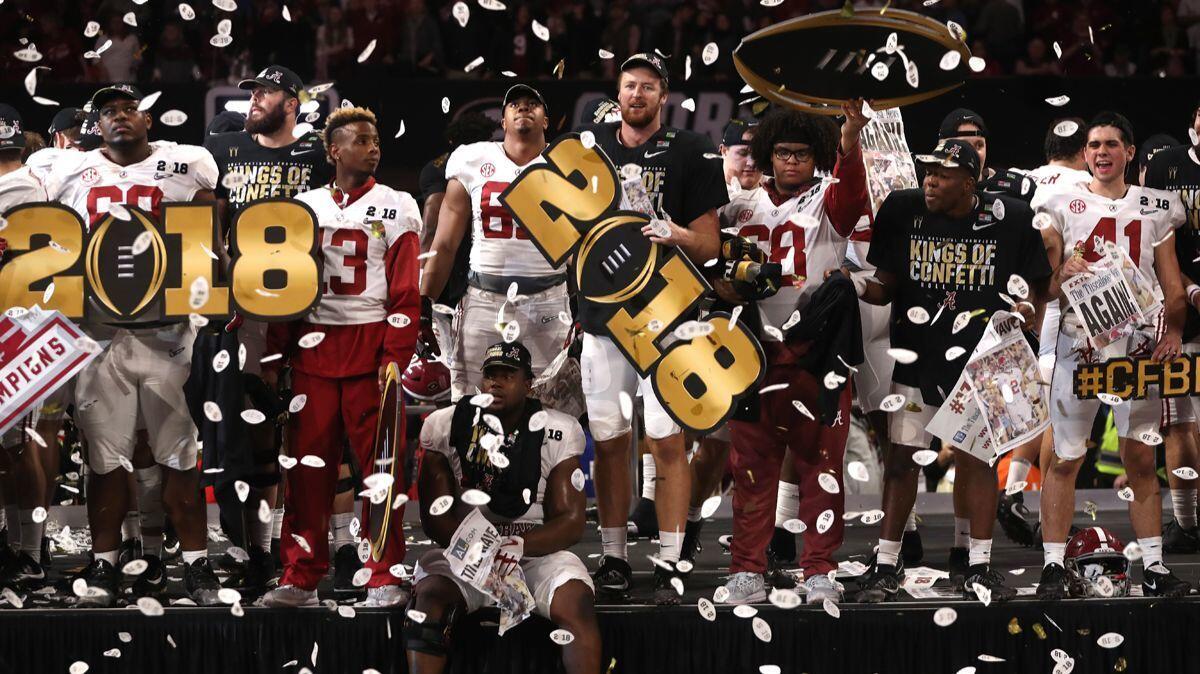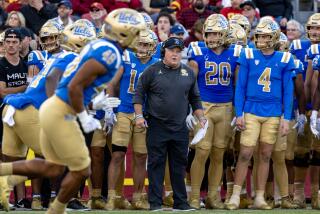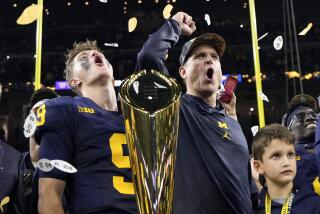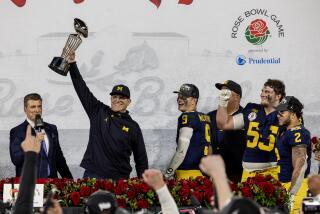Could Alabama’s victory in CFP championship be impetus to expand playoff field?

As the big game drew near, reporters asked Nick Saban a question that had nothing to do with run-pass options or linebacker blitzes.
They wanted the Alabama coach to expound upon the College Football Playoff, the system by which four teams are chosen to compete for the national championship.
Saban did not hesitate.
“As long as it’s subjective,” he said, “it can’t be totally fair.”
There is no doubt about the Crimson Tide’s victory over Georgia on Monday night. But the long touchdown pass that won the game in overtime couldn’t settle a larger debate over which teams should have been in the playoff to begin with.
Representatives from two of the five major conferences — the Big Ten and Pac-12 — weren’t invited to the party. And Alabama slipped into the bracket without winning the Southeastern Conference.
“Somebody is going to have an opinion of maybe how it could have been done another way,” Saban conceded.
The powers that be have wrestled with this puzzle for decades, walking a tightrope between the traditional splay of bowls and an enhanced mechanism for determining champions.
The Bowl Coalition came first, followed by the Bowl Alliance and the Bowl Championship Series, all of which sought to match the best two teams. The CFP represented another evolutionary step, establishing a small, hand-picked group to choose four candidates based on both measurable criteria and subjectivity.
As the CFP web site states: “Ranking football teams is an art, not a science.”
Scott Frost recently spoke for a large contingent of fans when he recommended an expanded playoff.
Frost coached Central Florida to a 13-0 record this season but had no shot at the title, in part because his school stood outside the influential circle of the Power Five conferences.
“Eight could include five conference champions and three at-large teams,” he told ESPN. “And if one of the Group of Five teams had a season like we had at UCF, then maybe we deserve to get in.”
A larger bracket would make room for diversity. It also might help diffuse the widespread perception in regions of the country beyond the South that the system tilts in favor of the SEC.
Frost, who has since jumped to Nebraska in the Big Ten, said: “I like any sport where things are decided on the field.”
Adding an extra weekend with four games might not seem like a lot, but university presidents have resisted the idea and they aren’t alone. Before the CFP title game, Georgia coach Kirby Smart wondered if his players could have handled another weekend.
“I’ve always kind of been of the belief it would be great to expand it, give more people the opportunity, but when do you play the games?” Smart said. “These kids we had, they went from an SEC championship game, one of the highest emotions, to final exams the next three days. Then they had Christmas break where we practiced them the whole time.”
Smart was asked about eliminating conference championship games, thereby creating a free week in the existing framework. An eight-team playoff presumably would draw more broadcast revenue, compensating for the lost date, but the coach wasn’t convinced.
“There’s a lot of value [to the title game], at least in our conference,” he said. “That’s a huge deal.”
So which options are left?
It has been suggested the CFP could guarantee a slot to each Power Five champion, sending No. 4 and No. 5 to a wild-card playoff in early December.
That would decide things on the field — no polls, no debates, and it would add just one game to the schedule. But it would exclude Group of Five programs. If any of those schools wanted a piece of the action, they would have to seek membership in a Power Five conference.
This solution would be imperfect at best.
Saban points out that the NCAA men’s basketball tournament stirs almost as much controversy, even with its 68-team bracket.
“It wouldn’t make a difference how many teams got in,” he said of an expanded bracket. “It would always be speculation as to who could have or maybe who should have.”
Yearly arguments about which teams should be selected might actually help promote the sport. However, in the aftermath of Monday’s title game, no one asked Saban about the playoff issue.
Reporters wanted to know about his freshman quarterback and his defense. They asked him about winning the sixth national championship of his career.
For one night, at least, the focus was on the football.
Follow @LAtimesWharton on Twitter
More to Read
Get our high school sports newsletter
Prep Rally is devoted to the SoCal high school sports experience, bringing you scores, stories and a behind-the-scenes look at what makes prep sports so popular.
You may occasionally receive promotional content from the Los Angeles Times.







